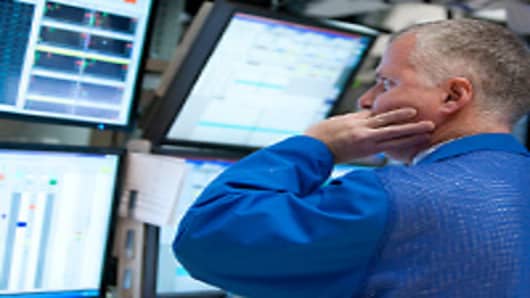September and October hold bad news for stock markets and banks remain overleveraged as we head into the second leg of the financial crisis according to Pedro De Noronha, the managing partner at Noster Capital in London.
"We are seeing one of the most challenging years for investors ever," De Noronha told CNBC Tuesday. "Major investors are simply leaving the market. When it looks like markets are about to fall off the cliff they rally and vice versa.
"There are problems coming from the resetting of US mortgages and (the) euro area remains a big worry," he said.
"Germany is unwilling to save any other European country," De Noronha said. "Merkel used up lots of political capital saving Greece and she saved the Greek bond market in order to save the French and German banking system from more big losses."
"There are four or five countries that have major structural problems that should not be in the euro," he said. "I still have (yet) to see a politician who will shoot themselves in the head on austerity."
"The Greeks have no choice but to cut, the others like Spain are not doing enough, I am with the 'Austerian' school and do not buy the Keynesian argument," he said.
On Monday, Nobel-prize-winning economist Paul Krugman called for another big stimulus programfor the US, saying "(e)verything is pointing to the need for more spending."
Laughable Tests?
De Noronha said he is also very worried about the banking industry and is shorting five of the biggest bank stocks in Europe: UBS, Barclays , Intesa Sanpaolo, Unione de Banche and BBVA.
"The recent stress testsmade me laugh," he said. "We only stress tested what the banks told us, I did not see anyone testing anyone until they had gone broke."
"When I look at Tier 1 Capital ratios, I find things propping them up that are not assets that can be drawn on in a crisis," he said. "The real capital 1 ratio of some major banks is just 1.7 percent and I am shorting five major European banks as a result."
The majority of banks remain over leveraged going into what could be the second leg of the financial crisis, De Noronha added.
“The regulators used 6 percent as the threshold for defining the minimum capital ratios, but that 6 percent number includes non-cash assets such as deferred tax assets and goodwill," he said. "If you use only tangible book equity the 6 percent of the biggest offenders turns into closer to 2 percent which implies a leverage ratio of 50 times. That is hardly conservative for current the current economic reality."
On Tuesday, Credit Suisse took a different stance, boosting its rating on banking to "overweight" from "market weight," saying that economic risks are "overplayed" and that "funding should be less costly than initially feared."




